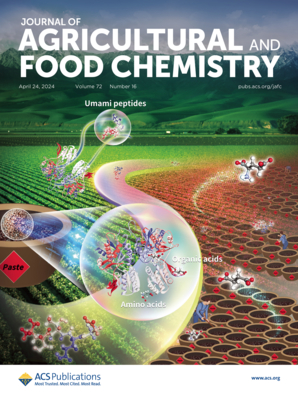freudenreichii 丙酸杆菌通过表层蛋白 SlpB 预防小鼠的食物过敏症
IF 6.2
1区 农林科学
Q1 AGRICULTURE, MULTIDISCIPLINARY
引用次数: 0
摘要
近几十年来,食物过敏症的发病率在工业化发达国家有所上升。这种缺陷受到生命早期环境因素的影响,包括人类肠道微生物群的早期定植者。治疗方案有限,缺乏有效的治疗方法导致人们开始寻找新的治疗方法,包括生物疗法。这一探索所取得的令人鼓舞的结果表明,免疫调节益生菌尤其可能产生新的生物治疗或预防策略,以应对日益加重的食物过敏负担。在此背景下,我们研究了弗氏丙酸杆菌 CIRM-BIA129(一种公认的免疫调节益生菌)对小鼠模型中食物过敏发生的潜在影响。在诱导小麦麦胶蛋白过敏的情况下,对这种益生菌的预防效果进行了评估。在使用麦胶蛋白致敏后,口服小麦麦胶蛋白进行挑战,监测临床和免疫学参数。口服 P. freudenreichii CIRM-BIA129 可以预防诱导性小麦胶蛋白过敏。给小鼠服用益生菌有利于 Treg 细胞的分化,而以 Th2 细胞为代价。值得注意的是,P. freudenreichii CIRM-BIA129 ΔslpB(包含编码参与粘附和免疫调节的关键表面蛋白的 slpB 基因突变)未能诱导相同的表型。因此,野生型益生菌能刺激人类外周血单核细胞产生 IL-10,而突变型益生菌则不能。总之,这些结果表明,P. freudenreichii CIRM-BIA129 菌株可通过表层蛋白 SlpB 介导的免疫调节作用减轻食物过敏反应。这一发现为旨在控制食物过敏发病率上升的生物疗法提供了新的视角。本文章由计算机程序翻译,如有差异,请以英文原文为准。

Propionibacterium freudenreichii Prevents Food Allergy in Mice via the Surface Layer Protein SlpB
The prevalence of food allergies has increased in recent decades in industrialized developed countries. Defects are influenced by environmental factors in early life, including early colonizers of the human gut microbiota. Therapeutic solutions are limited, and the lack of efficient treatments has led to the search for new treatments, including biotherapies. Promising results from this search suggest that immunomodulatory probiotic bacteria, in particular, may yield new biotherapeutic or preventive strategies to address the increasing burden of food allergies. In this context, we investigated the potential impact of Propionibacterium freudenreichii CIRM-BIA129, a recognized immunomodulatory probiotic bacterium, on food allergy development in a murine model. Preventive effects of this probiotic were evaluated in the context of an induced wheat gliadin allergy. Following sensitization using gliadins, clinical and immunological parameters were monitored following an oral challenge with wheat gliadin. When consumed orally, P. freudenreichii CIRM-BIA129 prevented induced wheat gliadin allergy. Probiotic administration favored the differentiation of Treg cells at the expense of Th2 cells in mice. Notably, P. freudenreichii CIRM-BIA129 ΔslpB, which contains a mutation in the slpB gene encoding a key surface protein involved in adhesion and immunomodulation, failed to induce the same phenotype. Accordingly, the wild-type probiotic stimulated IL-10 production by human peripheral blood mononuclear cells, while the mutant did not. Altogether, these results indicate that the P. freudenreichii CIRM-BIA129 strain can mitigate the food allergic response through its immunomodulatory effects mediated by the surface layer protein SlpB. This finding provides new perspectives for biotherapies aimed at managing the increased prevalence of food allergy.
求助全文
通过发布文献求助,成功后即可免费获取论文全文。
去求助
来源期刊
CiteScore
9.90
自引率
8.20%
发文量
1375
审稿时长
2.3 months
期刊介绍:
The Journal of Agricultural and Food Chemistry publishes high-quality, cutting edge original research representing complete studies and research advances dealing with the chemistry and biochemistry of agriculture and food. The Journal also encourages papers with chemistry and/or biochemistry as a major component combined with biological/sensory/nutritional/toxicological evaluation related to agriculture and/or food.

 求助内容:
求助内容: 应助结果提醒方式:
应助结果提醒方式:


